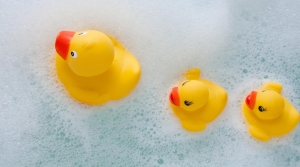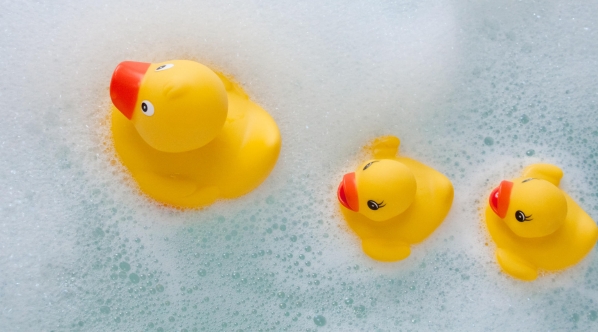“Play is important in learning concepts and in dealing with stressful situations,” said Dr. Geri Miller, a professor in the Reich College of Education’s (RCOE) Department of Human Development and Psychological Counseling. “And so I didn’t want to let go of the sober rubber duck race.”
“Play is important in learning concepts and in dealing with stressful situations."
Since the mid-90s, for each semester Miller taught an addiction counseling class (the Addictive Process course, Substance Abuse in the Family Systems course, and Counseling the Addicted Person course), the Sober Rubber Duck Races were included as part of the coursework. The rubber ducks are avatars of individuals who are addicted to marijuana (Addictive Process class) or families of individuals who are addicted (Substance Abuse in Family Systems class). The stories of the individuals and families are based on true life recovery stories that students chose from the book Marijuana Anonymous (addicted individual) or books such as Al-Anon or Beautiful Boy (families of addicted individuals). The race represents the recovery process of the individuals or families.
In past semesters the groups prepared their rubber duck individuals/families to race in the stream in Durham Park on campus. Due to COVID-19, courses and coursework were moved to alternative delivery methods, which included the Sober Rubber Duck Races.
To prepare for the race, students are divided into groups depending on the class. In the Addictive Process class, the groups were formed based on the multicultural topic panel presentation and in the Substance Abuse in the Family Systems, they were formed according to professional orientation (e.g. clinical mental health counseling, marriage and family therapy, or social work). In addition to each group receiving information about their duck's (ducks') active addiction and recovery process, they also received either an individual duck or a family of ducks for the race.
For this year, instead of gathering at the stream in Durham Park, students held their duck races in bathtubs, kitchen sinks, and streams behind their homes. One group member was responsible for submitting the video recording of the race, while the other members were responsible for creating a rationale as to why their duck(s) won, as related to the story they read about their duck(s)’s recovery. Watch Miller kick off the race. Watch videos from the students in both classes, which range from a few seconds to a couple of minutes here: The Substance Abuse in the Family Systems class - group 1, group 2, and group 3 - and the Addictive Process - group 1, group 2, group 3, group 4, group 5, and group 6.
Examples of rationales include:
“As you can see in the video attached, the father duck and daughter ducks were able to move fast when given a push. The mother duck who has the addiction is slowly moving behind but making progress in their recovery process. With all family members dedicated to recovery, progress happens! Even with the barriers of some bubbles, the ducks were able to strive forward through their recovery.”
“Our duck deserves to win the race because he went to treatment, 12-step meetings, and let go of his toxic friends of his past who encouraged him to use. Any duck that considers treatment is a winner. The grey duck behind him in the video is the friends of his past who are dead to him, so to speak. The bubbles represent all the barriers our duck had to overcome and even though he fell down a couple of times he kept swimming. If you can hear the birds in the background they represent other friends of his past encouraging him to use again because they “miss the old him.” But he remains set on his target and finishes the race to recovery.”
“Everyone wins the race - even if one duck makes it to the other side or one family member enters recovery, then it is a win,” said Miller.
"“Everyone wins the race - even if one duck makes it to the other side or one family member enters recovery, then it is a win.”
Also as part of the assignment, the groups designated a symbol or token for the individual/family, which is also based on the recovery story. Examples of symbols included bubbles, rocks, waves they made with their hands, using a hand to turn the duck right side up, having a grey duck represent their "old using friends", etc.
Jake Keller, a graduate student pursuing a dual master’s degrees in music therapy and marriage and family therapy, participated in the Sober Rubber Duck Race in a previous course as well as being a group member in the race held for the Substance Abuse in the Family Systems course.
“Experiencing a physical sense of community with others by walking down to the river during this activity was a significant part of the previous race,” said Keller.
“The virtual race was very different from previous races but unique in its own way,” he continued.
“The in-person duck race was more interactive, but the virtual one showed how no matter the situation, the ducks stayed together as a family to support the addict,” said Kirsten Cole, a graduate student in the clinical mental health counseling program.
The purpose of the assignment is to allow students to talk about substance abuse and recovery through metaphor.
“It’s a way to create a release of the seriousness of the topics of addiction and recovery in order to learn about it,” noted Miller. “The sober rubber duck race creates both a distancing and an anchoring to these weighty concepts.”
“I think the race helped most by allowing me to recognize that there are times when our clients might feel very much alone,” said Keller. “By experiencing this activity as a distanced group, I attempted to empathize with how the process of healing for clients might feel isolating at times during their process of treatment.”
“It also allowed me to identify my feelings and recognize the online resources I can use for myself and with our clients through social media and staying connected with others,” he added.
“It also allowed me to identify my feelings and recognize the online resources I can use for myself and with our clients through social media and staying connected with others.”
For undergraduate student and human services major, Michaela Wilson, “learning about various perspectives on addiction and recovery through real people, which were represented by the ducks,” were some of the concepts she gained through the virtual race.
“Especially in the final result that all of our entries are winners because everyone experiences recovery differently,” she added.
“The race gave me a visual representation of what a family may go through with addiction,” said Kaitlynn Divine, a graduate student in the marriage and family therapy program. “I was able to see visually through this race what obstacles a family might encounter when in addiction and how families can overcome those obstacles. Obstacles in this race included waves and bubbles. This race showed me visually how a family can be resilient.”
“I was able to see visually through this race what obstacles a family might encounter when in addiction and how families can overcome those obstacles. Obstacles in this race included waves and bubbles. This race showed me visually how a family can be resilient.”
Miller published her assignment in a 2015 book on group work, Group Work Experts Share Their Favorite Activities for the Prevention and Treatment of Substance Use Disorders, published by the Association for Specialists in Group Work, a division of the American Counseling Association. The book is a “practical resource, [which] presents group activities to support and enhance therapeutic and psychoeducational interventions for substance use disorders.” Miller has also presented on this activity at numerous national professional conferences.
Many of the concepts the students are learning in the Sober Rubber Duck Race can be transferable to the situation we are in with COVID-19 and social distancing.
“We can learn from the duck race that families need to bind together during hard times like this pandemic,” said Cole. “We can lean on each other for support.”
“I think that like in this race, we are all in a place where we may be experiencing new obstacles,” said Divine. “It is how we are able to overcome the obstacles that we faced that really show how we are able to adapt and overcome obstacles.”
“One factor in resilience is the capacity to play and use humor,” said Miller. “Under stress, we tend to get rid of anything extra - play, humor, exercise - the very ingredients that enhance our resilience under stress.”
“In order to complete this classroom exercise, students used the play and humor components built into the assignment to help them cope with their stresses as a result of COVID-19,” she noted. “In order to race their duck(s), they had to be creative and play. I am very proud of my students.”

